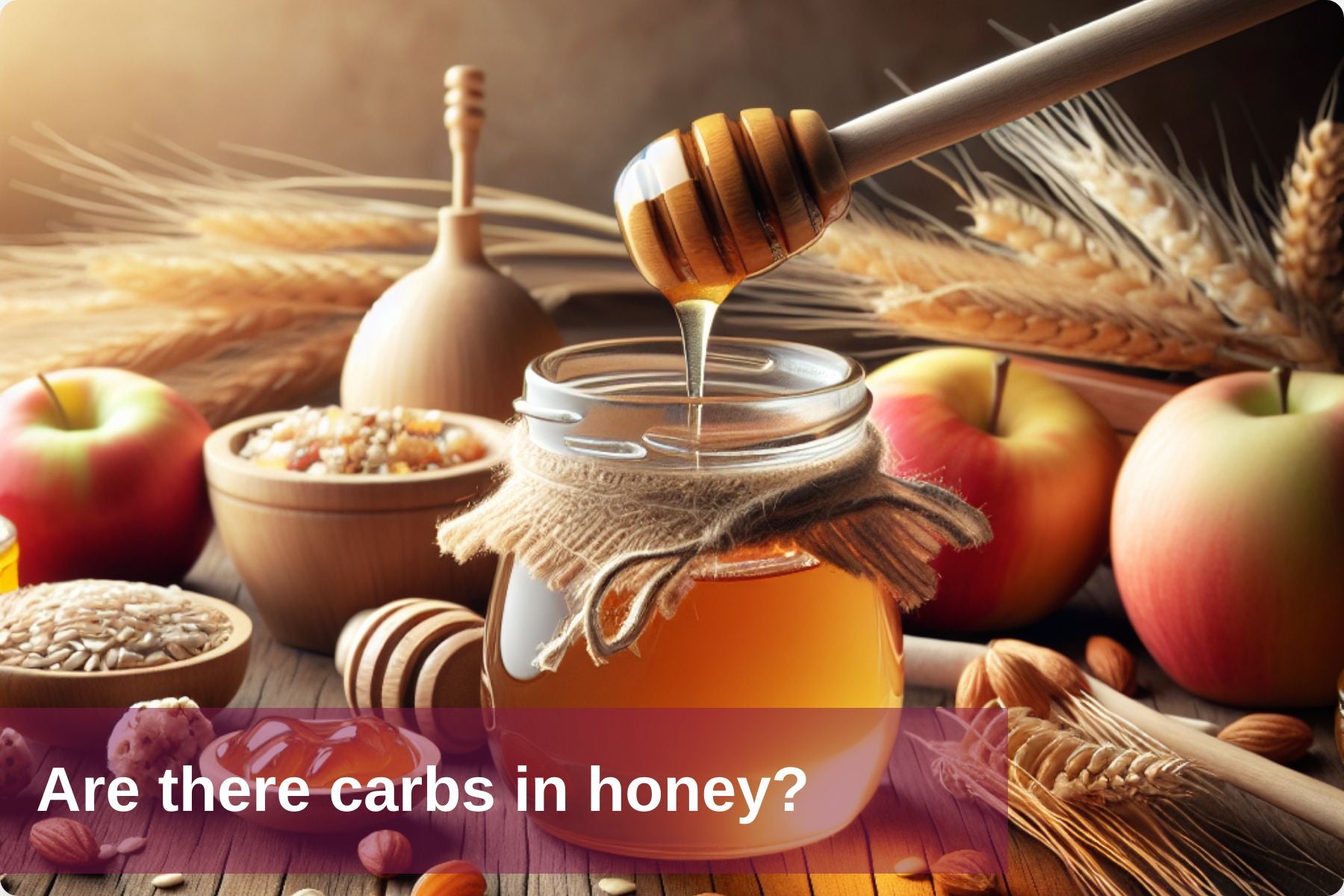
Are there carbs in honey?
Honey, the beloved golden nectar, is prized for its natural sweetness and used as both food and medicine. But beyond taste, understanding honey's nutrition is key, especially the carb content, for those managing their intake. As we explore, we'll uncover whether honey truly contains carbs - a core question for many.
With its sugars, vitamins and minerals, honey has a unique nutritional profile. While many love the flavor, its carb content raises questions - does this seemingly healthier sweetener fit low-carb diets? The significance is demystifying if honey aligns with carb-conscious eating.
Let's dive into the specifics of honey's carb content - the types of sugars present and their health impact. The goal is balancing honey's benefits with carb considerations.

Nutritional Composition of Honey
Firstly, honey is mostly made up of sugars, with fructose and glucose being the main ones. These natural sugars give you a quick energy boost, making honey a fast and efficient source of fuel. There are also some vitamins and minerals, though they're in smaller amounts, adding to the overall goodness of honey.
The two main sugars, fructose and glucose, have different jobs. Glucose is quickly absorbed, giving you a sudden burst of energy. On the other hand, fructose is processed more slowly, providing a steady release of energy. This combo makes honey a great sweetener for both quick and lasting energy needs.
Nutrition facts information for 1 tablespoon (21 grams) of honey:
Calories |
64 |
Fat |
0g |
Sodium |
0mg |
Carbohydrates |
17g |
Fiber |
0g |
Sugars |
17g |
Protein |
0.1g |
Potassium |
10.9mg |
Iron |
0.1mg |
Calcium |
1.3mg |
Versatile Uses of Honey
Use of Honey |
Items it may substitute |
|---|---|
Sweetener in Beverages |
Sugar, maple syrup, agave nectar |
Baking |
Sugar, maple syrup, agave nectar, molasses |
Marinades and Sauces |
Sugar, maple syrup, agave nectar |
Salad Dressings |
Sugar, maple syrup, agave nectar |
Glazing |
Sugar, maple syrup, agave nectar |
Facial Masks (skincare) |
Sugar (as exfoliant), aloe vera (soothing) |
Cough Suppressant |
Cough syrups (e.g., dextromethorphan-based products) |
Impact on Blood Sugar Levels
Glycemic Index: Honey has a moderate to high glycemic index (GI), depending on its variety and processing.
Immediate Blood Sugar Spike: Consuming honey can cause a rapid increase in blood glucose levels shortly after consumption.
Insulin Response: Due to its high carbohydrate content, honey triggers insulin release from the pancreas to manage elevated blood sugar levels.
Postprandial Blood Sugar: Honey can lead to a significant increase in postprandial (after-meal) blood sugar levels, particularly in large quantities or for individuals sensitive to carbohydrates.
Fructose Content: Honey contains fructose, which affects blood sugar differently than glucose but can still contribute to overall glycemic load.
Comparison with Table Sugar: While honey may have a lower glycemic index than table sugar, it still affects blood sugar levels similarly due to its high carbohydrate content.
Individual Variability: The impact of honey on blood sugar levels can vary among individuals based on factors such as insulin sensitivity, metabolic health, and overall diet.

Nutritional Facts: Carbohydrate Levels in Honey
Honey is indeed a carbohydrate-rich natural sweetener, with an average of 17 grams of carbohydrates per tablespoon. However, the composition of these carbohydrates, mainly fructose and glucose, sets honey apart from processed sugars.
The impact of honey on blood sugar levels is more gradual, thanks to its moderate glycemic index. This characteristic makes honey a suitable option for those looking to manage blood sugar levels, including individuals with diabetes. For those following a low-carb diet, moderation becomes the key to enjoying honey while staying within their carb limits.
Incorporating honey into a balanced diet can be a delightful experience when approached with mindfulness. Use it as a natural sweetener in moderation, considering both its unique flavor and nutritional benefits. Whether drizzled on yogurt, added to tea, or used in cooking, honey can enhance your culinary experiences while contributing to a nutrient-rich diet.
Be mindful of your overall carbohydrate intake, considering the context of your health goals and dietary preferences. By understanding the nuances of honey's carbohydrates and their impact, you can make informed choices that align with your wellness journey.
FAQs
-
Are there carbs in honey?
Yes, honey contains carbohydrates, mainly in the form of natural sugars such as glucose and fructose.
-
How many carbs are in a typical serving of honey?
A single tablespoon of honey contains approximately 17 grams of carbohydrates.
-
Will consuming honey impact my carb intake?
Yes, consuming honey will contribute to your overall carbohydrate intake, so it's essential to consider it when monitoring your carb consumption.
-
Are there any low-carb alternatives to honey available?
Yes, some alternative sweeteners like stevia or monk fruit are low in carbs and can be used as substitutes for honey.
-
How does honey compare to other sweeteners in terms of carbs?
Honey generally has a higher carbohydrate content compared to artificial sweeteners, so individuals following a low-carb diet may need to limit their honey consumption.
This Blog post is an initiative by Lo! Foods, to provide accurate and Nutritionist / Doctor approved information related to Health. Lo! Foods is India's leading brand for Everyday Functional Foods. Foods designed for specific Health conditions or Needs. Lo! Foods also runs India's largest range of Low Carb Healthy Cloud Kitchens, under the brand names of Lo!, ProteinChef, ATH (All Things Healthy) and DiabeSmart.















Leave a comment
Your email address will not be published.